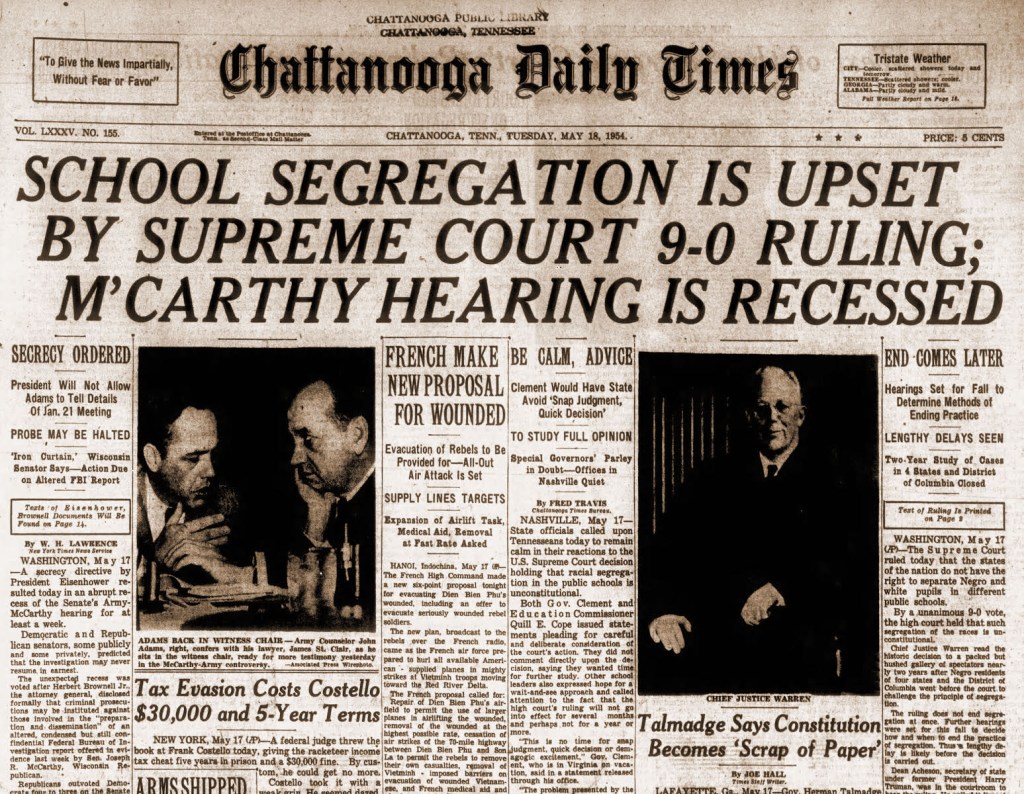TN History for Kids: Looking Back at the reaction to Brown v. Board
Published 11:29 am Friday, August 18, 2023
|
Getting your Trinity Audio player ready...
|
By BILL CAREY
Tennessee History for Kids
It’s August. As we children head back to an integrated public school system, I thought I’d point out how many Southern politicians reacted to the idea of an integrated school system 69 years ago.
On May 17, 1954, the U.S. Supreme Court handed down its decision in the case of Brown v. Board of Education of Topeka, Kansas. The high court ruled that segregation of children in public schools was unconstitutional, paving the way for school integration and the modern Civil Rights Movement.
I recently looked back at newspapers published on the day after the ruling, half expecting to find that that editors didn’t comprehend its significance. I was wrong. Pretty much every major newspaper in the South screamed Brown v Board on the top of the front page.
The ruling was story number one. Reaction to it from elected officials was story number two.
Some politicians were so angry that they hinted at violence. “There will never be mixed schools while I am governor,” said Georgia Governor Herman Talmadge. “[Georgians] will fight for their right under the U.S. and Georgia constitutions to manage their own private affairs.”
Talmadge went on to endorse the idea of Georgia abolishing its public schools and instead pay the cost of students attending private schools (an approach akin to what we now refer to as a voucher system.)
Other prominent politicians in Georgia echoed Talmadge’s sentiments. The Brown v. Board decision was “a flagrant abuse of judicial power,” said Georgia Senator Richard Russell. Lieutenant Governor Marvin Griffin – who would become governor a few months later – said “the races will not be mixed – come hell or high water.”
In South Carolina, Governor James Byrnes had a similar response, saying his state would “reluctantly abandon” public schools rather than integrate.
Governor William Umstead of North Carolina said he was “terribly disappointed” by the Supreme Court ruling. As for U.S. Senator Alton Lennon of that state, his reaction was negative, but contradictory. “I deplore the decision,” Lennon said, “but I have no comment until I have had an opportunity to read it.”
In Louisiana, Representative F. Edward Hebert said the decision was “the worst setback the South has ever had” and “it will set us back 50 years.”
Mississippi Governor Hugh White announced that he would appoint a commission whose purpose it would be to write legislation aimed at keeping schools segregated in the Magnolia State.
In Virginia, U.S. Representative Harry Byrd was extremely critical of the decision. “It is the most serious blow that has yet been struck against the rights of states,” he said. “Instead of promoting the education of our children, it will have the opposite effect in many areas of the country.”
However, not all Southern governors reacted in a vitriolic manner. In Virginia, Thomas B. Stanley said his state would comply with the high court ruling, contradicting the tone set by Representative Byrd. A similar reaction of “wait and see” came from governors in Texas and Arkansas.
In hindsight, no Southern politician reacted as thoughtfully as Tennessee Governor Frank Clement. Then on vacation in Virginia, Clement made the following statement:
“This is no time for snap judgment, quick decision or demagogic excitement. The problem presented by the Supreme Court decision must be solved only after careful study, deliberation and judicious appraisal. This will not be solved immediately and must not be considered hastily or in a disturbed or excited atmosphere.”
Clement’s statement was published the next day in big newspapers such as the Philadelphia Inquirer, Detroit Free Press and Arizona Republic.
About a year after the ruling, officials integrated Oak Ridge High and Robertsville Junior High – public schools in Anderson County run by the Atomic Energy Commission. In the fall of 1955, 85 Black students attended the two Oak Ridge schools – an event that came off with so little controversy and violence that the Knoxville News Sentinel headline said “Reporter Finds Little To Report as Negroes Attend Oak Ridge High.”
Then, in the fall of 1956, a federal court ordered the integration of Clinton High School – a school run by the Anderson County Board of Education. This time there were protests, threats and violence. On September 1, 1955, Governor Clement’s name made the papers across the country again, when he sent the national guard to Clinton to restore order.
Bill Carey is the executive director of Tennessee History for Kids, a non-profit organization that helps teachers teach social studies in general and Tennessee history in particular.






